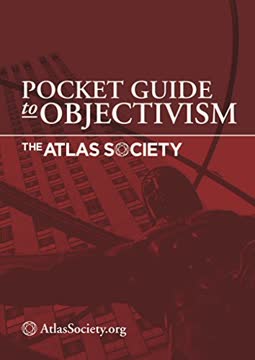
Key Takeaways
1. Objectivism: A Philosophy of Rational Self-Interest
My philosophy...is the concept of man as a heroic being, with his own happiness as the moral purpose of his life, with productive achievement as his noblest activity, and reason as his only absolute.
Ayn Rand's Objectivism is a comprehensive philosophical system that advocates for rational individualism. It encompasses:
- Metaphysics: Reality exists independently of our consciousness
- Epistemology: Reason is our means of gaining knowledge
- Ethics: Rational self-interest is the highest moral good
- Politics: Individual rights and laissez-faire capitalism
Objectivism rejects altruism, collectivism, and mysticism in favor of reason, individualism, and rational self-interest. It promotes the idea that humans can achieve happiness and flourishing through their own efforts and rational thinking.
2. Reality is Objective and Knowable Through Reason
Reality exists as an objective absolute—facts are facts, independent of man's feelings, wishes, hopes or fears.
Existence and identity are fundamental axioms of Objectivism:
- Things exist independently of our consciousness
- Everything has a specific nature or identity (A is A)
- Contradictions cannot exist in reality
Objectivism holds that:
- There is only one reality: the natural world we perceive
- There is no supernatural realm or higher power
- Causality governs all actions and events
- Consciousness is our means of perceiving reality, not creating it
This view forms the basis for Objectivism's emphasis on reason and rejection of faith or mysticism as sources of knowledge.
3. Reason is Our Primary Means of Survival and Flourishing
Reason integrates man's perceptions by means of forming abstractions or conceptions, thus raising man's knowledge from the perceptual level, which he shares with animals, to the conceptual level, which he alone can reach.
Reason as our cognitive tool :
- Perception provides direct awareness of reality
- Reason integrates perceptions into concepts and principles
- Logic is the method of non-contradictory identification
Key aspects of Objectivist epistemology:
- Objectivity: Commitment to facts regardless of emotions or desires
- Rejection of faith as a means of knowledge
- Emotions as products of our ideas and values, not tools of cognition
- Reason as an absolute, capable of understanding reality
This emphasis on reason underpins Objectivism's approach to ethics, politics, and art.
4. Morality is Based on Objective Values and Virtues
The Objectivist ethics holds man's life as the standard of value—and his own life as the ethical purpose of every individual man.
Rational self-interest is the core of Objectivist ethics:
- Life is the ultimate value and standard of morality
- Happiness is the highest moral purpose of an individual's life
- Virtues are principles of action for achieving values
Key Objectivist virtues:
- Rationality: Reliance on reason as one's only source of knowledge
- Productiveness: Creating value through work
- Integrity: Acting consistently with one's values
- Independence: Relying on one's own judgment
- Honesty: Refusing to fake reality
- Justice: Judging others objectively and acting accordingly
- Pride: Moral ambitiousness
Objectivism rejects altruism and self-sacrifice as moral ideals, instead promoting rational selfishness and the pursuit of one's own happiness.
5. Individual Rights are the Foundation of a Just Society
A 'right' is a moral principle defining and sanctioning a man's freedom of action in a social context.
Individual rights in Objectivism:
- Protect individual freedom to act on one's own judgment
- Are based on the requirements of human survival and flourishing
- Include rights to life, liberty, property, and pursuit of happiness
Key aspects of Objectivist political philosophy:
- Rights are rights to action, not to goods or services
- Government's sole purpose is to protect individual rights
- Objective law is necessary to define and protect rights
- Rejection of the initiation of force or fraud
This view leads to Objectivism's advocacy for a strictly limited government and laissez-faire capitalism.
6. Capitalism is the Only Moral Economic System
Capitalism is a social system based on the recognition of individual rights, including property rights, in which all property is privately owned.
Free market capitalism in Objectivism:
- Is the only system consistent with individual rights
- Separates economy and state, like separation of church and state
- Allows for voluntary trade to mutual benefit
Key aspects of Objectivist view on capitalism:
- Rejection of government intervention in the economy
- Opposition to welfare state, regulations, and antitrust laws
- Advocacy for free trade and open immigration
- Belief in the harmony of interests among rational individuals
Objectivism sees capitalism not just as an economic system, but as a moral ideal that allows individuals to pursue their own happiness and prosperity.
7. Art Serves as a Concretization of Philosophy
Art is the technology of the soul.
Art's role in Objectivism:
- Concretizes abstract philosophical ideas
- Serves man's need for cognitive and emotional fuel
- Provides a model of moral ideals
Key aspects of Objectivist aesthetics:
- Art as a selective re-creation of reality according to the artist's values
- Romantic realism as the ideal artistic approach
- Rejection of naturalism, modernism, and other non-objective styles
- Emphasis on heroic, life-affirming themes and characters
Objectivism sees art as crucial for human psychology and moral development, providing inspiration and a sense of what's possible in life.
Last updated:
Pocket Guide to Objectivism receives positive reviews, with an average rating of 4.16 out of 5. Readers find it a concise and readable introduction to Ayn Rand's philosophy. It's praised for its clarity and simplicity, making complex concepts accessible. Some readers use it as a follow-up to Rand's novels for better understanding. While most agree with the content, there's occasional disagreement on specific points. Overall, it's recommended for those seeking a quick overview of Objectivism.
Contenido de libros similares...
Contenido sobre el autor...